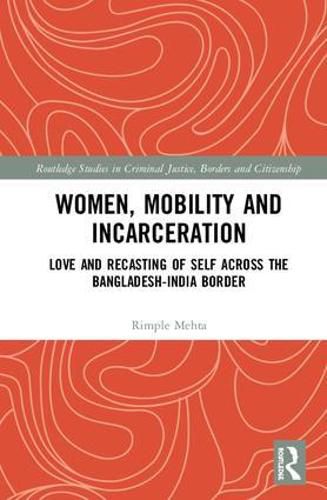Readings Newsletter
Become a Readings Member to make your shopping experience even easier.
Sign in or sign up for free!
You’re not far away from qualifying for FREE standard shipping within Australia
You’ve qualified for FREE standard shipping within Australia
The cart is loading…






This book explores how Bangladeshi women from poor and undereducated/semi-educated backgrounds who have crossed the Indo-Bangladesh border find themselves in prisons serving sentences under the Foreigners Act, 1946. Drawing on original fieldwork, this book explores these women’s understanding of borders and state sovereignty and how the women - from conservative rural and semi-rural backgrounds which impose a strict moral code - adjust to the socio-cultural context of an Indian prison, where being an inmate is dishonourable in their community.
This book examines the implicit challenge in these women’s action and decisions to these codes of honour, to accepted social norms of their religion and community, and ultimately, the dominantly patriarchal system that marks South Asian society. Further, it focuses on the negotiations that the Bangladeshi women make with the social and political borders they encounter in the process of crossing the Indo-Bangladesh border without requisite documents needed by the state for entry into a foreign land; how they cope with the daily challenges of living during their imprisonment in a correctional home; and their feelings about their impending return to Bangladesh. Women who are apprehended and criminalised for crossing borders must negotiate with not only the normative understanding of borders which is inherently masculine in nature, but also the gender biased lens through which female mobility is viewed: therefore, they not only cross political borders but also social borders.
This book maps the associations between women’s experiences of mobility and incarceration, and their linkages with social and political borders and the fraught experiences of being in a ‘foreign’ territorial space. It will be important reading for criminologists, sociologists, and those engaged in penology, women’s studies and migration studies.
$9.00 standard shipping within Australia
FREE standard shipping within Australia for orders over $100.00
Express & International shipping calculated at checkout
This book explores how Bangladeshi women from poor and undereducated/semi-educated backgrounds who have crossed the Indo-Bangladesh border find themselves in prisons serving sentences under the Foreigners Act, 1946. Drawing on original fieldwork, this book explores these women’s understanding of borders and state sovereignty and how the women - from conservative rural and semi-rural backgrounds which impose a strict moral code - adjust to the socio-cultural context of an Indian prison, where being an inmate is dishonourable in their community.
This book examines the implicit challenge in these women’s action and decisions to these codes of honour, to accepted social norms of their religion and community, and ultimately, the dominantly patriarchal system that marks South Asian society. Further, it focuses on the negotiations that the Bangladeshi women make with the social and political borders they encounter in the process of crossing the Indo-Bangladesh border without requisite documents needed by the state for entry into a foreign land; how they cope with the daily challenges of living during their imprisonment in a correctional home; and their feelings about their impending return to Bangladesh. Women who are apprehended and criminalised for crossing borders must negotiate with not only the normative understanding of borders which is inherently masculine in nature, but also the gender biased lens through which female mobility is viewed: therefore, they not only cross political borders but also social borders.
This book maps the associations between women’s experiences of mobility and incarceration, and their linkages with social and political borders and the fraught experiences of being in a ‘foreign’ territorial space. It will be important reading for criminologists, sociologists, and those engaged in penology, women’s studies and migration studies.